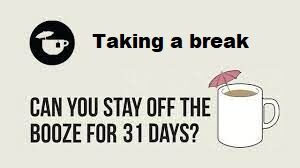Alcoholism
Sobriety Sampling: Voluntarily Quitting Alcohol for 30 Days
Can taking a short break from drinking make a difference? Absolutely.
Posted April 26, 2022 Reviewed by Abigail Fagan
Key points
- Taking a 30-90 day break from alcohol can put you in a better position to succeed in learning to drink in moderation.
- Even a month-long break from alcohol is associated with healthier drinking over time. You can break free of problematic drinking habits.
- Taking a time-limited break runs counter to the traditional abstinence-only approach—but it may be the approach that works for you.
There is evidence that taking a short break from alcohol can yield significant benefits and initiate meaningful change, especially in people concerned about the negative impact that drinking may be having on their lives.
If you or a loved one is a heavy drinker, taking a short break from drinking can open new possibilities, including learning to drink in moderation.
Can one month without drinking really open the door to change?

“Dry January”—voluntarily quitting alcohol for one month to start off a new year—is a growing phenomenon here in the United States and in parts of Europe. Several studies have found that in the months following completion of a “Dry January” many participants drink less, drink less often and feel a greater sense of self-control over their drinking. A study of 857 British adults found that at a six-month follow-up, the month-long break from alcohol was associated with healthier drinking.
An “Experiment with Abstinence”
Addiction psychologists, especially those practicing within a harm reduction or motivational model (the present author included), often suggest (similar to “Dry January”) a trial of “Sobriety Sampling” or an “Experiment with Abstinence” as the first step for individuals who do not want or need to stop drinking forever.
Taking a time-limited break runs counter to the traditional abstinence-only approach in the addiction field. In the traditional approach, anyone suffering from a significant alcohol problem should abstain permanently and completely from alcohol.
The evidence for sobriety sampling
The evidence shows that trying out or “experimenting” with change even for a relatively short period of time (as many “Dry January” participants experienced) can yield significant benefits and “jump-start” more lasting change.
I often suggest a period of 30-90 days to my clients, leaving the final decision up to the individual.
10 potential benefits from short-term abstinence
Some potential benefits (not an exhaustive list!) that you might accrue from an experiment with abstinence include:
- It can put you in a better position to succeed with moderation after breaking your habitual drinking pattern that has gone on “automatic pilot.” Temporary abstinence can be a good launching pad for attempting moderation considering the useful information it provides about the role of alcohol in your life and what triggers heavy drinking.
- It provides a unique opportunity to see things through a “different set of eyes” and to acquire valuable information about ways in which you think, feel, and behave in the absence of alcohol that is simply not attainable by other means.
- It helps to reveal the nature and extent of your attachment to alcohol, including the degree to which you rely on altering your mood with alcohol to cope with stress, other negative emotions, and have fun.
- It gives you greater access to your emotions and an opportunity to learn how to deal with them more effectively.
- It gives you a chance to experience rapid change and build greater confidence in your ability to exert self-control.
- It helps you identify more clearly the internal (environmental) and external (emotional) “triggers” of heavy drinking.
- It can help you rapidly reduce conflicts with family members and significant others (e.g., spouse, parents, etc.) and begin to increase trust.
- It gives you an indication of how easy or difficult it is for you to actually stop drinking.
- It exposes voids and unmet needs in your life that you may be trying to cope with by distracting yourself with alcohol.
- It may enhance or restore the effectiveness of prescribed medications you are taking for other problems such as depression or anxiety.
Learn more about if moderation can work for you or take a self-assessment to see if you have a drinking problem.
Copyright 2022 Dr. Arnold Washton. All Rights Reserved.
References
de Ternay, J., Leblanc, P., Michel, P., Benyamina, A., Naassila, M., & Rolland, B. (2022). One-month alcohol abstinence national campaigns: a scoping review of the harm reduction benefits. Harm Reduction Journal, 19(1), 1-17
de Visser, R. O., Robinson, E., & Bond, R. (2016). Voluntary temporary abstinence from alcohol during “Dry January” and subsequent alcohol use. Health Psychology, 35(3), 281


